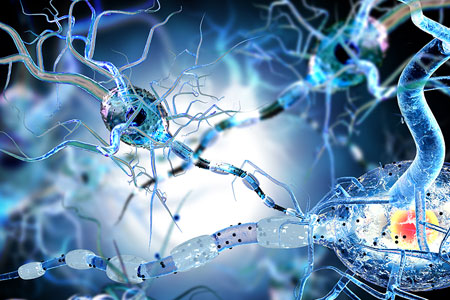WHAT ARE NCS AND EMG?
Nerve conduction studies (NCS) are tests that look to see how well your nerves are working. Electromyography (EMG) looks at how your muscles are working. Performed by a neurologist trained in this procedure, they can provide your doctor with specific information about the extent of nerve and/or muscle disorder and can also determine the exact location of the problem and give some indication whether the damage is reversible
The NCS test how well signals travel along a nerve, they are performed by placing electrodes on the skin, over certain nerves and muscles, and recording the speed and strength of responses when electrical impulses are applied to the nerve. The small electric impulses cause a short, mild tingling feeling. Several nerves may need to be tested depending on the problem
The EMG involves direct recording of muscle electrical activity at rest and during contraction by inserting a small needle electrode into various muscles. There may be mild discomfort when the needle is inserted into the muscle.

WHY IS IT DONE?
If you have numbness, decreased sensation, tingling, radiating pain, or burning, your doctor may refer you for a NCS/EMG. Symptoms such as muscle pain or cramping, muscle weakness, difficulty buttoning clothes, handling objects, or walking may also indicate the need for a NCS/EMG.
EMG results are often necessary to help diagnose or rule out a number of conditions such as:
- Muscle disorders, such as muscular dystrophy or polymyositis
- Diseases affecting the connection between the nerve and the muscle, such as myasthenia gravis
- Disorders of nerves outside the spinal cord (peripheral nerves), such as carpal tunnel syndrome or peripheral neuropathies
- Disorders that affect the motor neurons in the brain or spinal cord, such as amyotrophic lateral sclerosis or polio
- Disorders that affect the nerve root, such as a herniated disk in the spine
HOW DO YOU PREPARE?
At the time of an NCS/EMG appointment, the patient’s skin should be dry and clean without lotions, oils or creams. Wear loose and comfortable clothing on the day of the test.
Patients on anticoagulation or blood thinners and those with pacemakers or implanted defibrillators should notify the doctor performing the test, but generally this is not a contraindication. Patients on a treatment can take their usual medications on the day of the test
WHAT HAPPENS DURING THE TEST?
You’ll likely be asked to change into a hospital gown for the procedure and lie down on an examination table.
NCS: before the test is carried out your hands and possible your feet, depending on your particular problem, need to be warmed up. This is because your nerves work best when they are warm. Then some sticky pads (electrodes) will be placed on parts of your limbs, these are to record the responses from your nerves and tells us how well they are working. To make your nerve work we need to stimulate it. This is done either with some clips on your finger or with a special probe. You will feel a throbbing or tapping sensation coming from it. It feels odd, a bit uncomfortable but most people do not find it painful. This will be repeated several times in order to look at several nerves.

EMG: not all patients need to have this part of the test. It involves a very fine needle, similar to an acupuncture needle, being placed in a muscle. It acts like a microphone and allows us to listen to how well your muscle is working. While the needle is in place you will be asked to relax and then given some simple exercises to do to use that particular muscle. Often people do not like using their muscles with the needle in and can find it uncomfortable or slightly painful. However, most people tolerate the test and can do everything they are asked to do
NCS/EMG testing usually takes anywhere from 30 to 90 minutes, depending on the condition being tested and the findings of the study.
RISKS
A NCS/EMG test is extremely safe. EMG needles are sterile and are used for only one patient, are discarded immediately after use, are not recycled, and are immediately disposed of following use to prevent the transmission of infection. Side effects may include some muscle soreness, which rarely lasts more than an hour or two after the exam, and minor bruising where the needle electrode was inserted into your muscle. This bruising should fade within several days.
There are no restrictions on activity before or after the testing and there are no lasting after effects. The patient can return to his or her usual activities immediately upon leaving the laboratory.
RESULTS
The neurologist will interpret the results of your exam and prepare a report. Most test results are available within one to two days of testing. Your primary care doctor, or the doctor who ordered the NCS/EMG, will discuss the report with you at a follow-up appointment.
For more information and appointment, please contact:
INTERNAL MEDICINE DEPARTMENT
FV Hospital, 2nd Floor, F Building
Tel: (08) 54 11 33 33, Ext: 1299



